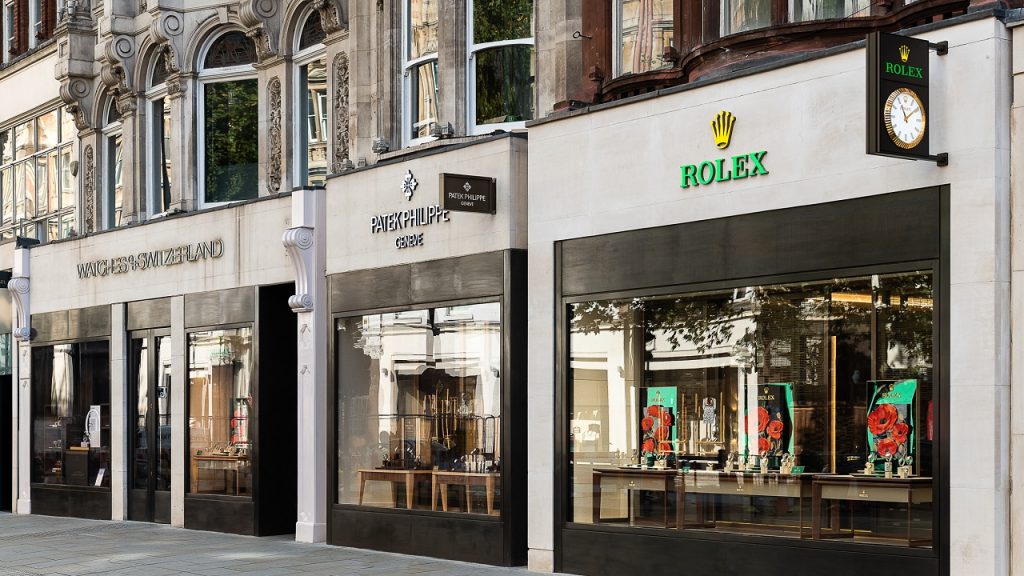
Rolex’s pending acquisition of watch and jewelry retailer Bucherer could fundamentally change the luxury watch industry, according to industry observers.
There’s concern and speculation throughout the industry regarding how the purchase will alter Bucherer’s relationship with its competitors, how it will affect “grey market” watch sales, and how it will influence Rolex’s relationships with its retailer network in the US, UK, and Europe.
In fact, the impact on Watches of Switzerland (WOS), Bucherer’s biggest competitor, was immediate, with its shares on the London Stock Exchange (LSE) plunging nearly 21% on the day after Rolex’s August 24 announcement.
WOS — which numbers more than 200 retail outlets, including 87 mono-brand boutiques — issued a statement on August 25 to reassure investors. Rolex will not have operational involvement in the Bucherer business, it will elect nonexecutive members to Bucherer’s board, and there will be no change to how Rolex allocates products, the retailer said.
Omega, Rolex’s closest competitor, issued a vaguely worded statement congratulating Rolex and Bucherer on the acquisition, pointing out that Omega generated nearly 40% of its sales from its own global network of stores.
“We do not have many points of sale within Bucherer’s stores, nor do we need many. There are also no current plans to increase that number,” the release read. “Naturally, we make regular adaptions and updates within our distribution network. However, our strategy is completely independent of other watch brands and is solely considered around Omega’s own planning.”
Bucherer operates more than 100 stores in Europe, the UK and the US. A total of 53 Bucherer stores distribute Rolex products and 48 offer the Tudor brand, Rolex’s sister company.
Rolex, in its brief statement about the acquisition, tried to assure the industry there would be no dramatic moves.
“Bucherer will keep its name and continue to independently run its business,” Rolex said. “The group’s management team will remain unchanged. The fruitful collaboration between Rolex and the other official retailers in its sales network will remain unchanged.”
Whether Rolex will manage to limit its influence is questionable, particularly in the long term, according to industry observers.
“Some people have faith the company can put up a firewall,” said Brendan Cunningham, professor of economics at Eastern Connecticut State University and founder of horolonomics.com, a website that specializes in the economics of the watch industry. “I don’t know how they are going to work that out. Over time there will be a temptation to do more through that relationship and leverage it a little more.”
“There is no reason Rolex will not push its watches into all 100 [Bucherer] stores,” added Alexander Linz of WatchAdvisor, a YouTube program about watches and the industry. “It won’t be tomorrow, but it will happen.”
In addition, this acquisition will likely allow Rolex to sell its most sought-after watches exclusively through Bucherer stores, Linz continued.
There’s also a belief that the move will affect online retailers of “grey market” watches — authentic goods that are sold through unauthorized sources — with Rolex having more control over its own distribution. Some authorized Rolex retailers give the most coveted Rolex timepieces to grey-market sellers, where they could get much more than the authorized price. Rolex wants to stop this practice.
“If the distribution process is in-house, they will have more tools to determine where their watches are going and to mete out consequences if people are doing what they are not supposed to be doing,” Cunningham observed. “It’s kind of a tough situation for Rolex because it can either cancel the distribution agreement or deal with the reputational impact when it happens. If something like that happens at Bucherer, you can do your own investigation and get rid of people responsible.”
Another area where the Rolex-Bucherer arrangement could provide leverage over other retailers is through used-watch sales. Bucherer was the first retailer to be approved for the Rolex Certified Pre-Owned (CPO) watch program, in which Rolex provides a certificate of authenticity, a two-year warranty and a wax seal tag for an approved pre-owned Rolex.
“The way it used to work is that Bucherer would send pre-owned watches for a once-over and service,” Cunningham explained. “They would charge Bucherer, and Bucherer would add it to the price. These transaction costs don’t have to happen anymore. That could make the Rolex CPO program at Bucherer a stronger competitor for the secondary market.”
One of the main unanswered questions is how this acquisition will affect the long-term relationships with its authorized dealer network. Rolex retailers include large luxury watch chains like WOS, German-based watch and jewelry retailer Wempe, and US luxury jewelry retailer Ben Bridge. However, the majority of its retail partners are independent retailers, many of whom depend on Rolex for a significant portion of their sales and as a way to attract people into their stores.
“I’m sure the authorized retailers are wondering, ‘What does this mean for us?’ I’m assuming those conversations, if they haven’t started already, are going to start soon,” Cunningham pointed out. “At a minimum, it puts folks on notice to have a ready alternative for distribution and maybe it will get some dealers to tighten up their businesses a little bit. Rolex is important to any retailer that has that dealer agreement. I’m sure having Rolex increases foot traffic.”
Source: Diamonds.net